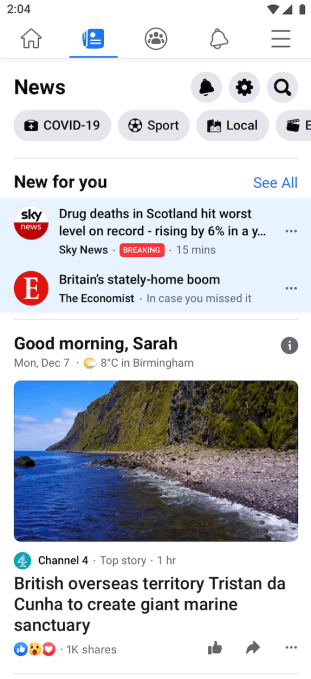
As the United Kingdom prepares to sharpen its focus on how it regulates big tech companies, Facebook is taking a big step up in the role it plays in presenting media to the U.K. public, and into how it works with the country’s media industry.
Today it is launching Facebook News in the U.K., Facebook’s first market outside of the U.S. for its dedicated, curated news portal — accessed, like the U.S. version, through a tab in the Android or iOS app menu.
 The portal will launch with content from hundreds of local and national media organizations including Channel 4 News, Daily Mail Group, DC Thomson, Financial Times, Sky News and Telegraph Media Group. The Economist, The Guardian, The Independent, STV and hundreds of local news sites from Archant, Iliffe, JPI Media, Midlands News Association, and Reach, as well as “lifestyle” titles GQ, Cosmopolitan, Glamour, Vogue and others were announced in an earlier list of partners last year.
The portal will launch with content from hundreds of local and national media organizations including Channel 4 News, Daily Mail Group, DC Thomson, Financial Times, Sky News and Telegraph Media Group. The Economist, The Guardian, The Independent, STV and hundreds of local news sites from Archant, Iliffe, JPI Media, Midlands News Association, and Reach, as well as “lifestyle” titles GQ, Cosmopolitan, Glamour, Vogue and others were announced in an earlier list of partners last year.
Again, as with the U.S. version, users will be provided a list of curated top stories of the day; a list of personalized stories based on news sources you might already follow or interests you have (these might be from publications you don’t already follow); and dedicated news sections for sports, entertainment, health and science and technology. Users can indicate when they like stories, or when they want to hide them to train the algorithms better.
Facebook has confirmed to us that it will be working with a service called Upday to curate the stories that appear on News. “The product is a mix of curated, top stories and personalized links chosen by algorithm,” a spokesperson said. Upday appears to be a joint collaboration between German publisher Axel Springer and Samsung, which also runs a news service on its phones powered by it.
It is not clear what the financial terms of the deal is between Facebook and Upday, but reportedly, the licensing deals Facebook is cutting with publishers to place their content in News collectively run into the tens of millions of pounds, with the biggest publishers making millions a year from the the agreements. While those figures might pale to what Facebook makes in ad revenues globally — that reaches into the tens of billions of dollars quarterly — they represent significant sums for the beleaguered U.K. media industry.
People have long used newsfeeds on Facebook and other social sites to catch up with news while also browsing posts from friends, Groups and Pages that they follow. Facebook News aims to take that a step further, as a curated page for links and headlines from hundreds of publications in the country to provide users of its mobile apps a one-stop place to read the stories of the moment.
Social media continues to be a major source of news for consumers, but as we’ve seen, a very skewed and flawed source at that.
Within that context, Facebook says that its intention with Facebook News is to provide a more balanced and dedicated mix of news to people beyond what they might encounter in their newsfeeds, while also tailoring it to users’ interests.
It also helps that Facebook News provides yet another way for Facebook — which has made efforts in video, entertainment content, mentoring and job-hunting, Nextdoor-style community listings, peer-to-peer selling, and more — to continue diversifying away from the Newsfeed for those who have grown bored with that: now, people can come to the Facebook app to browse news, too.
Still, this international expansion has been a long time coming: Facebook News first launched as a test in the US more than a year ago, in October 2019, before rolling out to all users last June.
No word from Facebook on how many users or engagement the U.S. version of Facebook News has picked up, except that “it has grown steadily,” according to a spokesperson.
It’s not clear why there’s been such a long gap between its first efforts in the U.S. and the U.K. launch today, but Facebook has had more going on in addition to securing those licensing deals to roll out in this market.
Launching a new news portal, with the message that it’s designed to “help” publishers, takes on a new dimension when you consider that Facebook has also been in the crosshairs of regulators in Europe, who have been on a long-term mission to scrutinize the reach of big tech companies. In the UK, that is soon taking the form of a new “pro-competition” Digital Market Unit that will re-examine the role companies like Facebook and Google play in advertising, media and more.
Whether those regulatory moves will impact how a service like Facebook News works, or what revenue cuts and usage data are shared with news partners, remains to be seen.
In the meantime, it’s full speed ahead for more scaling: Facebook confirmed plans last year that its long-term aim is for a bigger international expansion for Facebook News, with the longer list of countries including Brazil, France, Germany, and India. In a blog post today, Facebook’s director of news partnerships in Europe, Jesper Doub, confirmed France and Germany were next in line for Facebook News, although no launch dates were specified.

